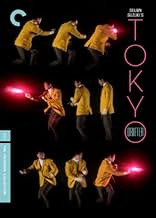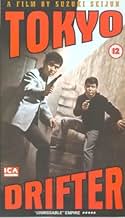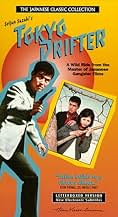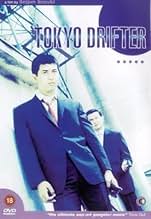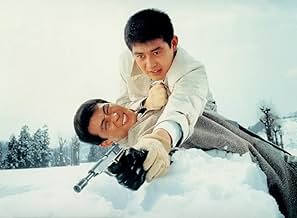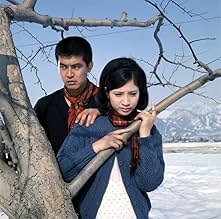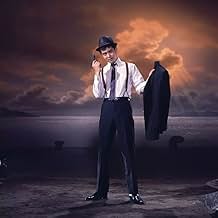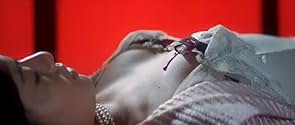IMDb RATING
7.1/10
10K
YOUR RATING
After his gang disbands, a yakuza enforcer looks forward to life outside of organized crime but soon must become a drifter after his old rivals attempt to assassinate him.After his gang disbands, a yakuza enforcer looks forward to life outside of organized crime but soon must become a drifter after his old rivals attempt to assassinate him.After his gang disbands, a yakuza enforcer looks forward to life outside of organized crime but soon must become a drifter after his old rivals attempt to assassinate him.
Featured reviews
Unless you have been blessed to track down the films of Suzuki Seijun, you will never, ever, have seen anything like this before. It has a plot - it is a gangster film - a hero, his girl and villains. There are betrayals and gunfights. You still won't have seen anything like this before. Imagine A BOUT DE SOUFFLE, shot in the style of UNE FEMME EST UNE FEMME, with a mixture of Leone, Welles, Melville, THE AVENGERS and Fuller's HOUSE OF BAMBOO. Not even close.
The basic plot concerns the title hero, a gangster trying to go straight. His boss and father-figure (this is a very Oedipal film, but the concept, with its many variations, is stretched to absurd breaking point), also a former gangster, is being pushed around by some extraordinarily attired hoods. The hero has a girl who sings big Michel Legrand-type numbers in a huge, blazingly colourful art deco/Busby Berkeley/Jean Cocteau-type nightclub. Because the hero is a maverick, he lies low for a while (i.e. drifts), but is followed by a hitman. All converges in a fairly predictable fashion.
To appropriate the ad, Plot is Nothing, Style is Everything. If a studio with big resources is, as Welles claimed, a 'toy set', then Seijun is the class freak. The monochrome gangster world is blown apart by shocks of colour, be they dazzling primary hues, or deliberately effete pastels. This serves to upturn the black and white ideology of the gangster genre. The men are all snarling and macho, but the hero sings and whistles, like the Duke's singing cowboy; the lead villain wears loud red shirts and sports a ridiculous moustache. There is even room in the plot for a gag about hairdryers.
Like in Godard, the crucial plot elements are roundly mocked; the seemingly major event of the hero being captured by and subsequently evading the police is as if filmed by an inept child. The group violence scenes are messy, like brawls at a children's party. There is even a bar-room brawl in a Western saloon in a Japanese gangster movie.
Mirroring Melville's heros, the hero aspires to aloof self-sufficiency, but he is constantly undermined by the film. Whole chunks of story don't make sense. The vertiginous editing is like the maniacal string-pulling of a puppeteer ,and there is a strong Brechtian feel to the film, with frequent breaks for cheesy song; impossible sets; unmotivated lighting; some of the most bizarre and beautiful camera movements in film.
All this stylistic bravura could be monotonous if it wasn't grounded intellectually and emotionally. There are some really beautiful oases of grace amid the violent mayhem. The film is a firm attack on the assumptions of genre, conformity, sterile repetition, linked to conformity in Japanese society at large, and big business in particular. Like 50s melodramas, the colour schemes, lighting and composition reflect the state of mind of the characters. The lengthy snow sequence is worthy of Joyce's 'The Dead'.
When it comes to Japanese cinema, I know we're all supposed to bow down to Kurosawa and Ozu, but I'll take the absolutely hatstand Seijun anyday. Breathtaking genius.
The basic plot concerns the title hero, a gangster trying to go straight. His boss and father-figure (this is a very Oedipal film, but the concept, with its many variations, is stretched to absurd breaking point), also a former gangster, is being pushed around by some extraordinarily attired hoods. The hero has a girl who sings big Michel Legrand-type numbers in a huge, blazingly colourful art deco/Busby Berkeley/Jean Cocteau-type nightclub. Because the hero is a maverick, he lies low for a while (i.e. drifts), but is followed by a hitman. All converges in a fairly predictable fashion.
To appropriate the ad, Plot is Nothing, Style is Everything. If a studio with big resources is, as Welles claimed, a 'toy set', then Seijun is the class freak. The monochrome gangster world is blown apart by shocks of colour, be they dazzling primary hues, or deliberately effete pastels. This serves to upturn the black and white ideology of the gangster genre. The men are all snarling and macho, but the hero sings and whistles, like the Duke's singing cowboy; the lead villain wears loud red shirts and sports a ridiculous moustache. There is even room in the plot for a gag about hairdryers.
Like in Godard, the crucial plot elements are roundly mocked; the seemingly major event of the hero being captured by and subsequently evading the police is as if filmed by an inept child. The group violence scenes are messy, like brawls at a children's party. There is even a bar-room brawl in a Western saloon in a Japanese gangster movie.
Mirroring Melville's heros, the hero aspires to aloof self-sufficiency, but he is constantly undermined by the film. Whole chunks of story don't make sense. The vertiginous editing is like the maniacal string-pulling of a puppeteer ,and there is a strong Brechtian feel to the film, with frequent breaks for cheesy song; impossible sets; unmotivated lighting; some of the most bizarre and beautiful camera movements in film.
All this stylistic bravura could be monotonous if it wasn't grounded intellectually and emotionally. There are some really beautiful oases of grace amid the violent mayhem. The film is a firm attack on the assumptions of genre, conformity, sterile repetition, linked to conformity in Japanese society at large, and big business in particular. Like 50s melodramas, the colour schemes, lighting and composition reflect the state of mind of the characters. The lengthy snow sequence is worthy of Joyce's 'The Dead'.
When it comes to Japanese cinema, I know we're all supposed to bow down to Kurosawa and Ozu, but I'll take the absolutely hatstand Seijun anyday. Breathtaking genius.
"Tokyo Drifter" is my introduction to the cinematic work of director Seijun Suzuki and it made quite a big impression. This is by far one of the most visually unique movies I have ever seen and the fact that it was made in 1966 makes it even more impressive.
Tetsuya played by Tetsuya Watari is a yakuza who has joined his boss Kurato (Ryuji Kita) in going straight. Unfortunately for both of them a rival gang begins threatening Kurato's legitimate business. After a brief confrontation Tetsuya is forced to leave his boss that way he would hopefully relieve the pressure between Kurato and the gang. Things don't go as smoothly as Tetsuya planned and he finds himself chased by gangs all over Japan.
The story is standard fare yakuza tale. With a hefty doze of betrayal, inner power struggles and a bit of melodrama in the form of Tetsuya's girlfriend. We've seen it all before. Now. What really sets this movie apart from any other is it's unique visual nearly surrealistic style. Suziki employs several tricks in order to assure that the film will remain distant from any other. His use of colors creates one part of the that. More accurately his use of color contrast, we see that in several scenes through the movie, for example during the final shootout we see gang members dressed in primarily black suits while the location itself was in mainly white bright colors. Tetsuya himself is often dressed in colors that merge him with the backgrounds further helping in the creation of the film's extravagant look. The second aspect of the movie's uniqueness is the camera work and the overall directing. Suziki employs techniques that are reminiscene of western movies and more specifically Sergio Leone's line of work. The final shootout again serves as a great example of that.
The acting is on par with the script, characters are well played by their respective actors. They don't make an overly big impression but certainly don't deteriorate the quality. The film has a good music score with a particularly memorable theme song by the main actor Tetsuya Watari that is always nice to hear and fit's very well with the mood.
"Tokyo Drifter" is a movie that offers stunning visuals and a plot that while not very deep in characterization is still able to carry the film's unique style. Mister Suzuki is able to impress, sadly his production company at the time wasn't on the same opinion and soon after he was fired and blacklisted for 10 years. A real shame for a director with such talent.
Tetsuya played by Tetsuya Watari is a yakuza who has joined his boss Kurato (Ryuji Kita) in going straight. Unfortunately for both of them a rival gang begins threatening Kurato's legitimate business. After a brief confrontation Tetsuya is forced to leave his boss that way he would hopefully relieve the pressure between Kurato and the gang. Things don't go as smoothly as Tetsuya planned and he finds himself chased by gangs all over Japan.
The story is standard fare yakuza tale. With a hefty doze of betrayal, inner power struggles and a bit of melodrama in the form of Tetsuya's girlfriend. We've seen it all before. Now. What really sets this movie apart from any other is it's unique visual nearly surrealistic style. Suziki employs several tricks in order to assure that the film will remain distant from any other. His use of colors creates one part of the that. More accurately his use of color contrast, we see that in several scenes through the movie, for example during the final shootout we see gang members dressed in primarily black suits while the location itself was in mainly white bright colors. Tetsuya himself is often dressed in colors that merge him with the backgrounds further helping in the creation of the film's extravagant look. The second aspect of the movie's uniqueness is the camera work and the overall directing. Suziki employs techniques that are reminiscene of western movies and more specifically Sergio Leone's line of work. The final shootout again serves as a great example of that.
The acting is on par with the script, characters are well played by their respective actors. They don't make an overly big impression but certainly don't deteriorate the quality. The film has a good music score with a particularly memorable theme song by the main actor Tetsuya Watari that is always nice to hear and fit's very well with the mood.
"Tokyo Drifter" is a movie that offers stunning visuals and a plot that while not very deep in characterization is still able to carry the film's unique style. Mister Suzuki is able to impress, sadly his production company at the time wasn't on the same opinion and soon after he was fired and blacklisted for 10 years. A real shame for a director with such talent.
If you are fed up by ordinary manufactured campiness, but still have normal levels of humor.. Which is to say if you find Austin Powers not only boring but trivial, you might check this out. It is high camp. It is ridiculous in ways that in other action films we readily accept: think the recent James Bonds. There is a joke product placement — for hair driers — that is really funny.
We have the ordinary sort of thing that qualifies: cheesy songs, goofy hero, posed action, jingly hipness. But we have a level of cheesiness that goes beyond the Tarrantino level, beyond the usual joke. The cinematography is one big joke, one that still works today because the big movies still use Vietnam era visual devices.
We have jokes on Bertralucci, Welles, Kurosawa. Leone of course. We have a couple stagings from Bergman even. It is not worth the effort to single out any Frenchman it seems, treating them with the contempt of wholesale dismissal.
Under ordinary circumstances, I would not recommend this because the usual level of the joke gets pretty tiring after 20-30 minutes. But the cinematic jokes and references keep coming, as though there were a catalogue (like we are told the Coen brothers keep). The blatant vacancy of the visuals is pretty damning.
Ted's Evaluation -- 2 of 3: Has some interesting elements.
We have the ordinary sort of thing that qualifies: cheesy songs, goofy hero, posed action, jingly hipness. But we have a level of cheesiness that goes beyond the Tarrantino level, beyond the usual joke. The cinematography is one big joke, one that still works today because the big movies still use Vietnam era visual devices.
We have jokes on Bertralucci, Welles, Kurosawa. Leone of course. We have a couple stagings from Bergman even. It is not worth the effort to single out any Frenchman it seems, treating them with the contempt of wholesale dismissal.
Under ordinary circumstances, I would not recommend this because the usual level of the joke gets pretty tiring after 20-30 minutes. But the cinematic jokes and references keep coming, as though there were a catalogue (like we are told the Coen brothers keep). The blatant vacancy of the visuals is pretty damning.
Ted's Evaluation -- 2 of 3: Has some interesting elements.
In my opinion, Tokyo Drifter is worth seeing, but comparing it to Branded to Kill is a bit like comparing apples and oranges.
Branded to Kill is eerie and nightmarishly weird--unforgettably, perhaps like a Hitchcock film or a dark film noire. Tokyo Drifter, on the other hand, is more "romantic." It is fun and chock full of mod 60s fashions and go-gos.
Both films are masterpieces of style. To me, Tokyo Drifter is worth seeing, but it has some silly moments. Somehow, I was left thinking of Woody Allen's What's Up Tiger Lilly and James Bond!
Branded to Kill is eerie and nightmarishly weird--unforgettably, perhaps like a Hitchcock film or a dark film noire. Tokyo Drifter, on the other hand, is more "romantic." It is fun and chock full of mod 60s fashions and go-gos.
Both films are masterpieces of style. To me, Tokyo Drifter is worth seeing, but it has some silly moments. Somehow, I was left thinking of Woody Allen's What's Up Tiger Lilly and James Bond!
In 1966 Nikkatsu, a Japanese studio, requested that one of their more "difficult" directors "calm down" on his next project. The director was Seijun Suzuki. The project was Tokyo Drifter. The result was anything but calm.
A film-noir shot through with moments of brilliant, lurid colour; the film defies all conventions be it genre, style or even something as mundane and unnecessary as narrative. One scene finds Tetsuya Watari's pouting yakuza in a tense showdown with his rival. Standing on train tracks, surrounded by clean, crisp snow the screen is split in two by a clearly visible dark blue line. The use of this visual effect is telling. It adds nothing to the story, to the characterisation, it simply looks good.
The closing sequence has to be seen to be believed. It is best described as the secret lovechild of a Gene Kelly musical and a John Woo action film. Amazing.
If for nothing else, Tokyo Drifter will long be remembered for the theme tune which hauntingly drifts through the entire film.
A film-noir shot through with moments of brilliant, lurid colour; the film defies all conventions be it genre, style or even something as mundane and unnecessary as narrative. One scene finds Tetsuya Watari's pouting yakuza in a tense showdown with his rival. Standing on train tracks, surrounded by clean, crisp snow the screen is split in two by a clearly visible dark blue line. The use of this visual effect is telling. It adds nothing to the story, to the characterisation, it simply looks good.
The closing sequence has to be seen to be believed. It is best described as the secret lovechild of a Gene Kelly musical and a John Woo action film. Amazing.
If for nothing else, Tokyo Drifter will long be remembered for the theme tune which hauntingly drifts through the entire film.
Did you know
- TriviaWas shot and edited in 28 days.
- Quotes
Tetsuya 'Phoenix Tetsu' Hondo: A drifter needs no woman.
- ConnectionsFeatured in Seijun Suzuki | TCM (2013)
- How long is Tokyo Drifter?Powered by Alexa
Details
Box office
- Gross worldwide
- $755
- Runtime
- 1h 29m(89 min)
- Color
- Sound mix
- Aspect ratio
- 2.35 : 1
Contribute to this page
Suggest an edit or add missing content

